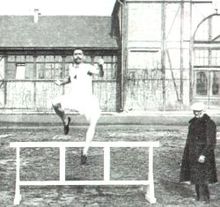Olympic Summer Games 1896 / Athletics - 110 m hurdles (men)

|
|
| sport | athletics |
| discipline | 110 meter hurdles |
| gender | Men |
| place | Panathinaic Stadium |
| Attendees | 8 athletes from 6 countries |
| Competition phase | 7/10 April 1896 |
| Medalist | |
|
|
Thomas Curtis ( USA )
|
|
|
Grantley Goulding ( GBR )
|
| Time schedule | ||
|---|---|---|
| date | Time | round |
| Tuesday April 7th | 2:30 p.m. | Prelims |
| Friday April 10th | 3:30 p.m. | final |
The men's 110-meter hurdles at the Olympic Games in 1896 was held on April 7th and 10th, 1896 in the Panathinaiko Stadium in Athens .
Some sources, including the Official Report, give the route length as 100 meters, other sources consider this to be a mistake. However, given the time elapsed, the longer route is likely. Sports-Reference states "... there is little doubt that the race was contested over the standard distance of 110 meters."
Eight hurdles, each 1.00 meters high, had to be crossed. At that time, the participants did not have a sophisticated hurdle technique. The hurdles were jumped over rather than overrun.
In addition to world record holder Stephen Chase (USA), the British co-favorite Godfrey Shaw was also missing .
Records
The unofficial world record was held by Stephen Chase and set in a race over 120 yards .
| World record | 15 s |
|
Stephen Chase | 1895 |
|---|
Results
Prelims
April 7, 1896, 2:30 p.m.
There were two preliminary runs, from which two runners - highlighted in light green - qualified for the final.
Forward 1
| space | Surname | country | time | |
|---|---|---|---|---|
| 1 | Grantley Goulding |
|
18.4 s | OR |
| 2 | Frantz Reichel |
|
unknown | |
| 3 | Alajos Szokolyi |
|
unknown | |
| 4th | Anastasios Andreou |
|
unknown |
In the presentation by Ekkehard zur Megede, in contrast to the result listed here, Alajos Szokolyi is second, Frantz Reichel is third. Szokolyi is also named there as one of the two runners who waive their right to start in the final. However, the author does not give any reason for the waiver, so the version for Reichel on rank 2 is more likely.
Forward 2
| space | Surname | country | time | |
|---|---|---|---|---|
| 1 | Thomas Curtis |
|
18.0 s | OR |
| 2 | William Hoyt |
|
unknown | |
| 3 | Kurt Doerry |
|
unknown | |
| 4th | Athanasios Skaltsogiannis |
|
unknown |
Deviating from this result, Volker Kluge and Ekkehard lead Fritz Hofmann to the Megede in 3rd place in the second run . Other sources mention Carl Galle .
final

April 10, 1896, 3:30 p.m.
Only Curtis and Goulding competed in the final. The runners-up in the preliminary runs did not exercise their right to start due to overlapping dates. Hoyt started in the pole vault, which was held at the same time, where he won the gold medal. Reichel looked after his compatriot Albin Lermusiaux in the marathon, which was also held on the same day.
In the finals, Goulding, who was considered to be a technically better hurdler, led to the last hurdle before Curtis overtook him thanks to his higher final pace. For example, Curtis won the gold medal he was aiming for after giving up the 100 meters .
There is conflicting information about the distance between the two runners. Sports-Reference speaks of five centimeters, while Kluge and zur Megede indicate a time of 18.0 s for Goulding, which implies a significantly larger lag.
| space | Surname | country | time | |
|---|---|---|---|---|
| 1 | Thomas Curtis |
|
17.6 s | OR |
| 2 | Grantley Goulding |
|
18.0 s (?) |
Web links
- SportsReference Men's 110 meters Hurdles , accessed July 12, 2018
- 110m hurdles men from olympic.org, accessed July 12, 2018
literature
- Volker Kluge , Olympic Summer Games - The Chronicle I, Berlin 1997 ( ISBN 3-328-00715-6 )
- Ekkehard zur Megede , The history of Olympic athletics, Volume 1: 1896–1936, Verlag Bartels & Wernitz KG, Berlin, 2nd edition 1970
Individual evidence
- ↑ SportsReference Men's 110 meters Hurdles , accessed July 12, 2018
- ↑ a b Ekkehard zur Megede , The History of Olympic Athletics, Volume 1: 1896–1936, Verlag Bartels & Wernitz KG, Berlin, 2nd edition 1970, p. 21